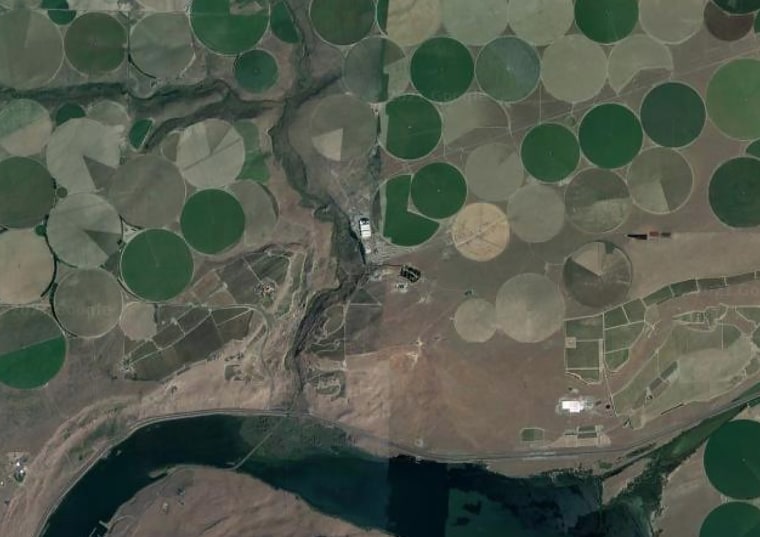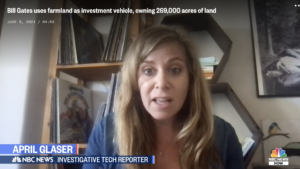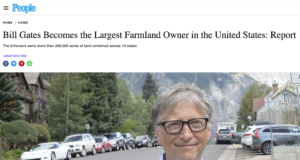NBC News Investigative Tech Reporter April Glaser in June 9, 2021 NBC News video segment: “Local farmers I spoke to in south Georgia and north Florida said Gates is doing the same thing that Big Ag did before he got there. He uses a lot of fertilizer that leaches into the rivers and causes big algae blooms.” …
“Bill Gates is not the one in overalls. He is not the one on the tractor doing the farming. He is the landlord here.”
“Young farmers ….going up against billionaire investors. Who can compete with the likes of Bill Gates? More and more we are seeing farmers turn into renters.” … More farmland could be “gobbled up by investor class.”
They own the soil where the potatoes in McDonald’s french fries grow, the carrots from the world’s largest producer and the onions that Americans sauté every night for dinner. But they’re far better known for their work in tech and in trying to save the climate.
Bill and Melinda Gates, who recently announced they’re getting divorced and are dividing their assets, are deeply invested in American agriculture. The billionaire couple, in less than a decade, have accumulated more than 269,000 acres of farmland across 18 states, more than the entire acreage of New York City. The farmland was purchased through a constellation of companies that all link back to the couple’s investment group, Cascade Investments, based in Kirkland, Washington.
Data gathered by The Land Report and NBC News show that their land holdings range from 70,000 acres in north Louisiana, where their farmland grows soybeans, corn, cotton and rice, to 20,000 acres in Nebraska, where farmers grow soybeans. They bought and later sold an additional 6,000 acres in Georgia, NBC News found. In Washington, the Gateses own more than 14,000 acres of farmland that includes potato fields so massive that they are visible from space and some of which are processed into french fries for McDonald’s. And in Florida, farmers grow carrots on their property. These land holdings are separate from their previous investments in companies that support large-scale farming like Monsanto and the tractor manufacturer John Deere.

But Gates, known for his philanthropic work solving some of the world’s most pressing public health and climate problems, has suggested that he does not treat his American farmland investments as part of his broader plans to save the planet.
“My investment group chose to do this,” Bill Gates said on Reddit in March when asked about his farmland purchases while promoting his latest book, “How to Avoid A Climate Disaster.” “It is not connected to climate.” He did acknowledge that more productive farming techniques can help reduce deforestation in other parts of the world.
Though the Gateses are major owners of American farmland, the couple’s holdings only represent a fraction of the 283 million acres of farmland that is owned and rented out by nonfarmers. But that could soon change. About 40 percent of farmland is owned by seniors 65 or older, according to 2014 estimates by the U.S. Department of Agriculture, meaning more farmland is expected to come on the market soon.
That could spell an opportunity for young farmers hoping to get their start, but for savvy investors scrambling for more places to put their money, it also represents an opportunity. Financial titans like Prudential and Hancock have divisions specifically for investors looking to make money on farmland portfolios.
The trend worries young farmers who cannot compete with the likes of Bill Gates when buying land, according to Holly Rippon-Butler, a farmer in upstate New York and the land campaigns director at the National Young Farmers Coalition.
“If you’re looking at what this means for farmers on the ground looking to access land, there’s significant competition from nonfarmers, and that really affects young farmers because it means that the price that they’re trying to compete with on the marketplace is driven and determined by people who are not dependent on a farming income,” Rippon-Butler said.
Adjusted for inflation, average farm real estate values have generally risen since 1993, growing from less than $1,500 an acre in the mid-’90s to over $3,000 an acre in 2020, according to the USDA. The agency further found that over 50 percent of cropland is rented to farmers who don’t own their land.
“The attraction that people have to investing in farmland is that it tends to be countercyclical to the stock market. It’s a hedging strategy,” said Daniel Bigelow, a professor of agricultural economics at Montana State University, who previously served as a USDA research economist. In other words, when the economy is struggling, the value of farmland generally doesn’t depreciate.
Cascade Investments declined to comment on its interest in acquiring so much American farmland, but a spokesperson for the firm, Charles V. Zehren said it is “very supportive of sustainable farming.” He pointed out that in 2020, the acreage that Bill Gates’ firm owns was all enrolled in a sustainability program. That program ensures agriculture on the land is audited to meet standards, like soil health and water management, created by the nonprofit Leading Harvest, which counts one of the subsidiaries of Gates’ investment firm as a partner.
“Leading Harvest requires farmland owners to work to continuously improve soil health, biodiversity, and water, air and crop quality on their farms as well as contribute positively to local communities, comply with regulations, and provide a safe and respectful working environment for employees,” Zehren said.
“Shell of a shell of a shell”
Public records suggest Cascade Investments has bought its farmland through a web of at least 22 limited liability shell companies across the country. These shell companies have made it difficult to find out where and how much farmland the Gateses own even for local farmers, like John S. Quarterman, a farmer and landowner who grows okra, corn, squash and other vegetables in Lowndes County on the southern edge of Georgia.
That’s where the Gateses began buying land in 2013 through two limited liability corporations registered to an address in Kirkland by Derek Yurosek, then head of agriculture operations for Cascade.
When Quarterman first heard about Gates’ firm buying land in the area, he began digging through local property records, linking addresses and business records from registered owners to Kirkland-based companies, until he was able to piece together that the companies buying multiple tracts of land in the Suwannee River Basin were all a “shell of a shell of a shell company investing for Bill Gates.” NBC News’ independently confirmed that there were, in fact, shell companies tracing back to Gates’ firm that purchased 6,021 acres across four counties in Georgia.
In Georgia and Florida, NBC News independently confirmed through research of property records that the Gateses’ investment firm owns more than 7,000 acres through two limited liability companies, Lakeland Sands and Lakeland Sands Florida, LLC. Both companies were founded in 2012 with the same address as Cascade Investments in Kirkland, which later changed its mailing address to a Louisiana post office box assigned to Oak River Farms, another subsidiary of Cascade.
NBC News also found that another 6,500 acres in north Florida are owned by yet another company, Suwannee River Terra, which was also started with an address in Kirkland and an email address from the Bill and Melinda Gates Investment Firm, which is now registered to the current chief counsel of Oak River Farms with a mailing address in Kansas, according to property records.
In every state where the Gateses own land, a tangled web of locally registered limited liability companies follow. While those companies don’t explicitly name Cascade Investments as the owner in their public records, they do share the address of Cascade in Kirkland, Washington, or the address of a Cascade subsidiary, list the names of Cascade employees who registered the companies and sometimes even email addresses from the Bill and Melinda Gates Investment Group.
Algae bloom
But some farmers whose land is adjacent to that of the Gateses have expressed disappointment that despite the couple’s wealth, they have not done more to preserve the environment. Quarterman also serves as the Suwannee Riverkeeper and advocates for conservation of the intricate network of springs and rivers in the region, where water from the swamps of Georgia flow into Florida before they release into the Gulf of Mexico. He said that this is where large tracts of rich farmland is used to raise livestock and grow many of the vegetables that end up in grocery aisles up and down the East Coast.
All that farming has led to large water withdrawals from Florida’s aquifer system and requires fertilizer, which leaches through the ground into waterways, emptying nitrogen that has led to destructive algae blooms and severe loss of fish and marsh habitats.
He hoped Gates would have invested in different farming techniques that could help turn around the ecological damages from big agriculture.
“Well, you’d think, if you’re looking for somebody with enough capital to try that, he would go first. Right? But he didn’t,” Quarterman said. “He never did anything that different from before he got here and what other farmers were doing nearby.”
Quarterman guessed that may be because Bill Gates isn’t the one doing the farming. He’s the landlord, or rather, the companies owned by his investment firm are the landlords. And not all the renters are local.
But Zehren of Cascade noted that the firm has been working in Florida and elsewhere to promote ecologically conscious agriculture and that it plans to continue to evaluate its farmland portfolio to improve its overall sustainability.
“In enrolling in Leading Harvest, Cascade has implemented new initiatives on its farmland holdings ranging from adding additional pollinator habitat in Nebraska to planting wildlife-friendly trees on dry pivot corners in Florida to hosting grain bin safety rescue training for the local community in Louisiana to converting numerous diesel power units to electric to reduce carbon output, to name a few,” Zheren said.
Carrots, onions and french fries
A survey of the Gateses’ farmland holdings shows that a broad range of the vegetables that Americans eat can be traced back to his land and that some of this land has also been owned by other billionaires. Starting in 2012, Gates’ investment firm began buying family farms in South Georgia. One of those farms, Stanley Farms, specialized in Vidalia onions, and another, Coggins Farms, focused on growing carrots. In 2014, Cascade Investments combined both of those companies and the land into Generations Farms, which continued to grow vegetables.
Some of that land, including nearly 300 acres, was sold in 2019 to the California-based Grimmway Farms, the world’s largest carrot producer. Another 5,500 acres was sold to Generation Land Georgia, a company that shares an address with Miami-based Optimum Agriculture, which bought Generations Farms in 2019. Members of the Stanley family now work for Generations.
In north Louisiana, the Gateses’ investment firm owns about 70,000 acres of land through at least three other shell companies. There farmers primarily grow soybeans, rice, corn and cotton. One of the largest plots of land owned by a subsidiary of the Gateses’ investment arm in Louisiana, Angelina Plantation, was previously owned by former WorldCom CEO Bernard Ebbers, who died last year, a month after being released from prison. That land is now largely rented out to various farmers.
Along the Columbia River border between Washington and Oregon, the Gateses purchased 100 Circles Farm, a 14,500-acre plot of land, for $171 million in 2018, according to property and business records. There, on Gates’ parcels, an industrial farm grows potatoes for McDonald’s french fries. Cascade declined to comment on its specific land holdings.
But farmer advocates say the Gateses’ large-scale farm purchases don’t make room for smaller farmers to break into the market. After all, few can out-bid Bill Gates.
“Farmers just aren’t owning the assets anymore. Someone else is owning that asset, whether it’s rented equipment or land. Someone else is building that equity on their back,” said Johnathan Hladik, the policy director at the Center for Rural Affairs, who is also a farmer in Nebraska. “When Bill Gates, or whatever other investment arm owns the land, a farmer still needs to farm it. But they’re just renting it. So if now the best farmers can do if you want to stay in farming is rent this land, you’re not going to get the benefits that come with land ownership.”
Fake meat
While the Gateses are best known for their philanthropic work tackling large-scale societal problems, like funding the coronavirus vaccine and controlling malaria via the Bill and Melinda Gates Foundation, they have also invested in some companies rethinking food production and have endorsed the use of genetically modified seeds as one way to increase farming productivity and feed more people globally.
In 2010 the Gates Foundation Trust invested about $23 million in Monsanto, the genetically modified seed and chemical company, though it sold its shares the next year following outcry from environmental groups.
Bill Gates was also an early investor in fake-meat companies aiming to combat the environmental harms of raising livestock by creating more convincing, plant-based alternatives. He backed Impossible Foods, which relies on genetically modified soybeans, and also held shares of Beyond Meat through the Bill and Melinda Gates’ Foundation Trust, though SEC filings show those shares were sold in 2019. In May, Bill Gates also transferred about $850 million in shares of the agricultural machinery company John Deere to his wife after the two shared publicly their plans to divorce.
Besides the enrollment of their landholdings in Leading Harvest, the Gates Foundation in 2020 also created an agricultural nonprofit, Gates Ag One, which focuses on bringing affordable solutions to small-scale farmers in sub-Saharan Africa and South Asia to improve crop productivity. The Gates Foundation said in a statement that its agriculture efforts do not extend to farming in the U.S.
But those working on projects with both investors and farmers to create ecologically sustainable farming methods and support diverse and disadvantaged farming communities say rethinking agriculture and working to avert a climate crisis go hand in hand. They add it will take those with large parcels of land, like the Gateses’ U.S. farmland holdings, to do it.
“We know that one of the best ways to sequester carbon is through the soil. And that it’s going to take big swaths of land, like what Bill Gates has taken, to do that,” said Konda Mason, the founder and president of Jubilee Justice and Potlikker Capital, which funds and supports regenerative agriculture projects owned by people of color.
Mason notes that trying to draw hard lines between one’s philanthropic work and one’s investments does not work.
“Now you have a foundation where the mission on one side is to save the world and to do all these wonderful things surrounding climate, and on the other side they’re investing in the exact same things that are causing the harm that the mission side is trying to protect,” Mason said. “It makes no sense.”.
#
“By the start of 2020, Chinese owners controlled about 192,000 agricultural acres in the U.S., worth $1.9 billion, including land used for farming, ranching and forestry, according to the Agriculture Department,” Politico reported.“The current trend in the U.S. is leading us toward the creation of a Chinese-owned agricultural land monopoly,” noted Rep. Dan Newhouse (R-Wash.) during a House Appropriations hearing.
Source: https://www.politico.com/news/2021/07/19/china-buying-us-farms-foreign-purchase-499893
Left-Wing ‘Fact Check’ Says Bill Gates ‘Reportedly’ Owns More Farmland In U.S. Than Any Other Individual – The ‘fact check’ stressed that Gates’ ownership ‘represents less than 1% of all the farmland in the United States.’
Bill Gates has quietly become largest farmland owner in America while pushing fake ‘synthetic meat’
People Mag: Bill Gates now owns the most farmland of anyone in the United States, according to a recent report from The Land Report. The outlet reported this week that Gates, 65, owns 268,984 acres of land combined across 19 states. Of that number, 242,000 acres are of farmland, 25,750 acres are of transitional land and 1,234 acres are of recreational land, according to the report. States Gates owns land in include Washington, California, Idaho, Wyoming, Colorado, New Mexico, Arizona, Nebraska, Iowa, Wisconsin, Illinois, Michigan, Indiana, Ohio, North Carolina, Florida, Mississippi, Arkansas and Louisiana. … While Gates owns the most farmland, he does not own the most land total in the U.S.: John Malone takes that title, owning 2.2 million acres of land, according to The Land Report‘s list of Top 100 landowners. …
Gates is worth $121 billion, according to Forbes, and the Bill and Melinda Gates Foundation is the largest private charity in the world. … The foundation has donated millions of dollars in grants to promote sustainable agriculture in South Asia and sub-Saharan Africa, and launched the non-profit Gates Ag One in 2020 to “speed up efforts to provide smallholder farmers in developing countries, many of whom are women, with access to the affordable tools and innovations they need to sustainably improve crop productivity and adapt to the effects of climate change.”
https://twitter.com/backtolife_2023/status/1550792630321254401




